Syria
US, British and French forces launched military air strikes on multiple government targets in Syria early on Saturday in response to a suspected chemical weapons attack that killed dozens of people last week.
The intervention is the biggest by Western powers against Syrian President Bashar al-Assad in the country’s seven-yearcivil war and pitted the US and its allies against Russia.
In a televised address from the White House, Trump said: “A short time ago, I ordered the United States Armed Forces to launch precision strikes on targets associated with the chemical weapons capabilities of Syrian dictator Bashar al-Assad.”
“These are not the actions of a man. They are crimes of a monster instead,” Trump said referring to Assad and his role in the chemical weapons attacks.
As he spoke, at least six loud explosions were heard in Damascus on Saturday and smoke was seen rising over the Syrian capital.
Syrian state TV said the army’s air defences shot down 13 missiles fired in a US-led attack in the Kiswah area south of the capital Damascus.
US Defence Secretary Jim Mattis and Marine General Joseph Dunford said three main chemical weapons facilities were targeted at 9 pm EST (1 am GMT) by missiles from both the sea and aircraft, which triggered Syrian air defences; a scientific research centre in Damascus, a chemical weapons storage facility west of Homs and a chemical weapons equipment storage and an important command post, also near Homs.
The Pentagon could not confirm how many missiles hit their targets but said no other attacks were planned.
They acknowledged that the strike was designed to degrade Syria’s chemical weapons capability without killing civilians or the many foreign fighters in Syria’s multi-sided civil war, particularly those from Russia.
“We specifically identified these targets to mitigate the risk of Russian forces being involved,” Dunford told reporters, adding the US military advised Russia of airspace that would be used in the strike but did not “pre-notify them.”
“The purpose of our actions tonight is to establish a strong deterrent against the production, spread and use of chemical weapons,” Trump said.
The US president had sharply critical words for both Russia and Iran, which have backed Assad’s government.
“To Iran and to Russia, I ask, what kind of a nation wants to be associated with the mass murder of innocent men, women and children?” Trump said.
UK Prime Minister Theresa May said the strikes were not about “regime change,” but “about a limited and targeted strike that does not further escalate tensions in the region and that does everything possible to prevent civilian casualties.”
May said while the strike was targeted at Syria, it sent a message to anyone who used chemical weapons.
Britain has accused Russia of being behind a nerve agent attack on a former Russian spy in England last month, a charge Moscow has rejected.
The Prime Minister
— UK Prime Minister (10DowningStreet) April 14, 2018theresa_mayhas made a statement on Syria: https://t.co/bBfYyowUIo pic.twitter.com/QlTeFXmOkt
“This is the first time as prime minister that I have had to take the decision to commit our armed forces in combat and it is not a decision I have taken lightly,” she said.
“I have done so because I judge this action to be in Britain’s national interest. We cannot allow the use of chemical weapons to become normalised within Syria, on the streets of the UK, or anywhere else in our world.”
French President Emmanuel Macron said France had joined the US and Britain in an ongoing operation of strikes to target Syria’s chemical weapons facilities.
“We cannot tolerate the recurring use of chemical weapons, which is an immediate danger for the Syrian people and our collective security.
“The red line set by France in May 2017 has been crossed,” he said.
Le samedi 7 avril 2018, à Douma, des dizaines d’hommes, de femmes et d’enfants ont été massacrés à l’arme chimique.
La ligne rouge a été franchie.
J’ai donc ordonné aux forces armées françaises d’intervenir. https://t.co/Vt9LcFcFzH pic.twitter.com/Dc726PHfAR— Emmanuel Macron (@EmmanuelMacron) April 14, 2018
US Defence Secretary James Mattis said the air strikes were a “one time shot” to send a strong message to Assad.
The US and its allies fired more than 100 missiles at Syria.
Mattis told reporters there were no reports of US losses in the operation.
US joint Chief of Staff Marine General Joseph Dunford said the strike was designed to degrade Syria’s chemical weapons capability without killing civilians or the many foreign fighters in Syria’s multi-sided civil war, particularly those from Russia.
Russia’s ambassador to the US warned that there would be consequences for the US-led military strikes, adding that it was not acceptable to insult Russia’s president.
Statement by the Ambassador Antonov on the strikes on #Syria:
A pre-designed scenario is being implemented. Again, we are being threatened. We warned that such actions will not be left without consequences.
All responsibility for them rests with Washington, London and Paris. pic.twitter.com/QEmWEffUzx— Russia in USA ?? (@RusEmbUSA) April 14, 2018
Russia’s Foreign Ministry said the strikes came as Syria had “a chance of a peaceful future” and were an “outrageous violation” of international law.
Spokeswoman Maria Zakharova wrote on Facebook: “First the ‘Arab spring’ tested the Syrian people, then Islamic State, now smart American rockets. The capital of a sovereign government, trying for years to survive under terrorist aggression, has been attacked.”
Iran’s Foreign Ministry has also strongly condemned the airstrikes and warned of its regional consequences.
A senior official in the regional alliance that has supported President Bashar al-Assad in the Syrian war has said the attack on Syria will be seen as limited if it is now over and there is no second round of strikes.
Syria has denied carrying out the chemical attack and warned that Western military strikes would risk starting a war.




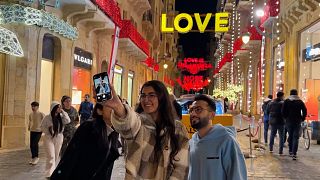
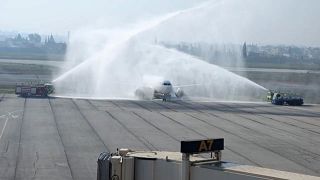
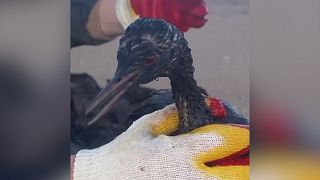

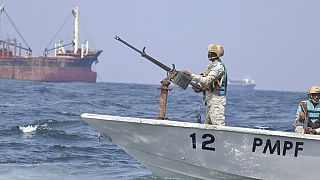
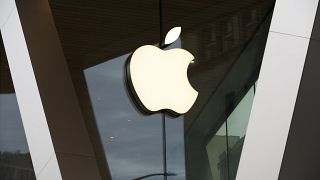

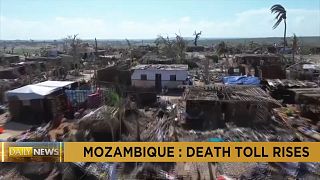
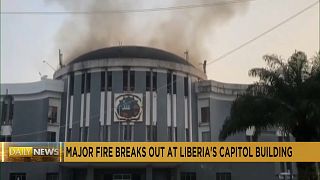
01:29
Transition in Syria: Russian troops under scrutiny by new government
01:00
Homs celebrates the end of Assad's regime
01:10
Syrian rebel leader Jolani denies getting foreign backing
02:00
Israel, US bombings in Syria risk further destabilization, says legal analyst
01:27
Syrians rush to notorious prison to search for loved ones
01:00
The looting of Bashar al-Assad's presidential palace